Interview of the President of Tajikistan Emomali Rahmon to the correspondent of the UNTV channel
Read also
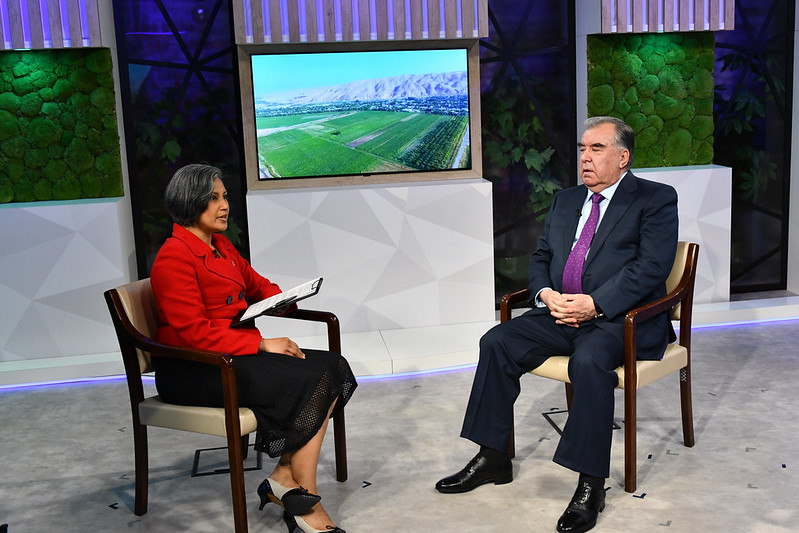
DUSHANBE, 24.03.2023 (NIAT Khovar) – On March 22, the Founder of Peace and National Unity — Leader of the Nation, President of the Republic of Tajikistan, Honorable Emomali Rahmon, in New York of the United States of America, on the sidelines of the United Nations Water Conference — 2023, gave an interview to a correspondent of the UNTV channel.
It is worth noting that the influential organization on the planet, the United Nations, has its own website and a special TV channel, which broadcasts materials about the daily activities of the Organization, its institutions, as well as the progress and results of working sessions.
During the interview, President Emomali Rahmon spoke about the constant efforts, initiatives of the Republic of Tajikistan in the field of water, including the organizational issues of the United Nations Water Conference, the main objectives of the proposal of the fifth initiative of Tajikistan regarding the announcement of 2025 as the International Year of Glaciers’ Preservation and proclaiming of March 21 of each year as the World Glaciers Day to be marked starting from 2025, on the readiness of Tajikistan to promote water related issues, including following the results of the United Nations Water Conference — 2023.
At the initiative of Tajikistan, the UN General Assembly has adopted 9 resolutions over the past 20 years on water related issues, which laid a favorable basis for declaring 2003 the International Year of Freshwater, 2013 — the International Year of Water Cooperation, and 2005-2015 and 2018 -2028 — International Decades of Action «Water for Life» and «Water for Sustainable Development», respectively.
It was emphasized that all these creative initiatives are aimed at the benefit of humanity and the solution of problems related to water and sanitation at the global and regional levels.
President Emomali Rahmon noted that previous experiences have proved that only in cooperation can the world community provide a decent life for the population of the planet.
During the conversation, United Nations television correspondents also received specific answers to their questions regarding the efforts and initiatives of the President and the Government of the Republic of Tajikistan towards solving other pressing problems of human society, including climate change and the impact of natural disasters related to water and climate, on the economy of countries, priority areas of activity, as well as the foreign policy of the leadership of the state and the Government of the Republic of Tajikistan.
Excellency, at the outset, I congratulate you on the successful start of the historic United Nations Water Conference hosted by your country. Please tell me why this Conference is important and how it differs from other water conferences?
— Thank you very much for your congratulations. You rightly pointed out that this is indeed a historic conference, because it is the second water conference in the history of the United Nations, which is taking place almost 50 years later after the first one. We, as hosts of the Conference, made significant efforts and hope that it will become historic not only in terms of time, but also in terms of its effective results.
Data show that the water resources are affected by various challenges, including climate change, population growth, urbanization, industrialization, and other factors. Unfortunately, the international community’s efforts in this area have not been enough. We need to increase our efforts and actions in this area to achieve the Sustainable Development Goals, including the sixth goal and other internationally agreed goals related to water.
In this regard, in the process of preparation for the Conference, we focused on ensuring commitments to launch new initiatives and speed up the ongoing ones. The Water Action Agenda, which we presented in Dushanbe, includes many actions and commitments, and we believe that this document will be strengthened as a result of the New York Water Conference.
We really need to change our approach to the most important source of life, i.e. water resources, and start managing them in a new and efficient way through innovative methods. The importance of the Conference, from our point of view, should be reflected in the adoption and implementation of such serious transformations.
Thank you very much. Indeed, it is very gratifying that this Conference could bring the world community together to address the water issues. However, the important thing is not the conference itself, rather its result and impact on addressing the existing issues. Can you please tell me, what are the next steps to make the Conference a real influencer and change-maker?
— Yes, the result is important, especially the one, which helps the vulnerable countries address the water issues. The innovative and executive commitments and actions set out in the Action Agenda must be realistic and feasible in order to build coalitions and unions around them. It is gratifying that a large number of such voluntary commitments have already been incorporated into the Water Action Agenda. We need to establish an effective mechanism to monitor the implementation of these commitments.
In my view, we should avail all opportunities in this process. First, the outcome and message of the Conference should be coherent and coordinated with other key activities related to water, climate change, natural disaster prevention and generally all issues related to the implementation of sustainable development goals.
Secondly, the water issue should be prioritized on the agenda of the United Nations and other international and regional organizations.
It is also necessary to regularly arrange conferences and meetings of the United Nations in order to continuously monitor the implementation of commitments, including the Water Action Agenda. Therefore, we proposed to conduct the next UN Water Conference in Dushanbe in 2028 at the end of the Decade of Action.
In addition, during the implementation of these actions and commitments and the Water Action Agenda overall, we proposed to widely use the Dushanbe Water Process as a tracking platform.
Third, more capital and funding need to be channeled to vulnerable, less developed and developing countries to solve the water-related issues.
Thank you. Tajikistan’s commitment to promote the water issues and, in particular, to follow up on the results of this Conference is commendable. In your speech at the opening of the Conference, you stated that Tajikistan has been leading water issues on the world development agenda for two decades. Could you please tell me, what is the main goal of these initiatives and measures and to what extent will your country benefit from this work?
As early as in 1999, Tajikistan for the first time initiated at the United Nations platform to declare 2003 as the International Year of Freshwater.
Later, at the initiative of my country, 2013 was declared the “Year of Water Cooperation”, 2005-2015 and 2018-2028, the international decades of action «Water for life» and «Water for sustainable development» respectively.
Dushanbe — the capital of Tajikistan — has hosted several high-level international events related to the implementation of these initiatives.
The last important occasion in this area was the announcement of 2025 as the International Year of Glaciers’ Preservation at our initiative through a relevant resolution of the United Nations General Assembly in December of last year.
The main goal of the above actions is to draw the attention of the international community to this global issue.
These efforts and actions we have undertaken, made it possible to make our commitments and objectives related to water more comprehensive during the implementation of the Sustainable Development Goals along with the Millennium Development Goals and the inclusion of water issues in the agenda of climate, biological diversity, food and energy.
Tajikistan, as a regional water resource country, is also in favor of water efficiency in the region and beyond.
Therefore, the support of all our initiatives by the international community and the recognition of Tajikistan as one of the leading countries in the discussion of global water issues is a great achievement. We believe that with this initiative we have contributed to the efficient and fair use of water resources at the global level.
At the national level, we have made significant achievements in terms of public awareness of water use.
You mentioned the International Year of Glaciers’ Preservation. Indeed, the topic is very important. Could you please tell me, from your point of view, to what extent this initiative can promote the preservation of glaciers?
— Glaciers, which are the main source of fresh water, are unfortunately depleting every year under the influence of climate change. More than 1000 glaciers have completely melted in Tajikistan in the last few decades. We notice the rapid melting of glaciers in other parts of the world also, including the Arctic and Antarctica.
On the other hand, the ever increasing population is leading to demand in water at the same rate.
In this context, the water availability per capita indicator has also been decreasing every year and declined to 2.5 times in the last five decades, which is a matter of concern.
The rapid melting of glaciers as the main source of fresh water is an alarming process and we need to take effective and joint actions to prevent it. The main goal of this initiative is also to draw the attention of the international community to the importance of this issue and to unite efforts to reduce the negative impact of global processes on the melting of glaciers.
The announcement of the World Day of Glaciers, the creation of a dedicated fund and the arrangement of an international conference on this issue in Dushanbe in 2025 are the important means to achieve these goals.
Let’s return to the goals and outcomes of today’s Conference. The Republic of Tajikistan and the Kingdom of the Netherlands as the hosts of this important global event have undertaken a lot of efforts to ensure its success. What did your country learn from this process and what will it take away from its outcomes?
Indeed, it is a matter of pride that the international community has entrusted us with this important role. However, we have to keep in mind that this is a great responsibility, which we understand very well and together with the Kingdom of the Netherlands, United Nations agencies and other partners, we tried to make the Conference truly successful and historic in terms of outcomes.
The main experience we gained in this process is the right and targeted review of the water issue, which finally brought all the countries of the world together in a constructive dialogue at the initiative of Tajikistan and the Netherlands.
Another important aspect that I would like to emphasize is that it is important to unite the efforts of the international community and international organizations in the implementation of joint actions in order to achieve the expected outcomes.
I wish you good luck! And the last question — You are indeed one of the world leaders who constantly follow the water issue. In this regard and taking into account the current processes related to water issues, what would be your message for the international community?
In recent years, we have witnessed unprecedented droughts and floods, which caused deep concern for everyone due to their large scale and geographical coverage. Unfortunately, current actions at the global level are still not enough.
The goal of our initiatives in the field of water and glacier preservation through water diplomacy and the efficient use of water resources is to highlight the problems in this area to the international community and find solutions.
There is no country in the world free of water issues. This issue is observed in various spheres of life of the people globally. In some countries, people are water scarce for drinking, irrigation, sanitation and other aspects. On the other hand, many natural disasters such as droughts, mudslides, floods, avalanches, etc. cause a lot of damage to economy and people’s lives. That’s why I believe that reliable advanced mechanisms for water supply and effective management of water-related issues should be developed and implemented in all these issues both at the national, regional and global levels. Because, if we turn a blind eye to existing issues, we will not be able to achieve the sustainable development goals in all countries.
Our efforts in the field of water have proven that water can play an effective role as a binding driver in relations between states. Tajikistan stands ready to share its experience in this field with all partners.
To this end, this Conference has provided a very suitable opportunity, and I am sure that the international community will avail it accordingly.
Messages of the President of Tajikistan at the interview to the UNTV correspondent:
— Water resources under the huge pressure coming from climate change, urbanization, population growth, industrialization and etc;
— Assessments indicate that despite some progress, our actions and efforts need to be quadrupled to attain SDG6 and other water-related goals;
— It is a time to establish a dedicated unit within UN System on water and appoint UN Special Envoy on Water;
— Regular meetings are needed, perhaps every two to three years to review and analyze water-related actions and commitments;
— Considering interlinkages of water with other SDGS, water should be integrated in other global agendas and high-level gatherings.











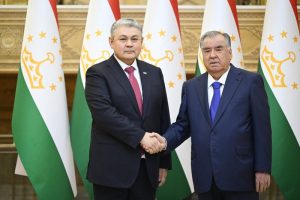 President Emomali Rahmon, Received the Minister of Foreign Affairs of the Republic of Kazakhstan
President Emomali Rahmon, Received the Minister of Foreign Affairs of the Republic of Kazakhstan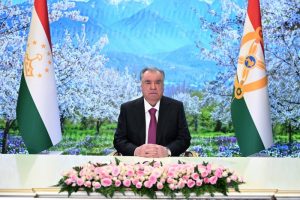 President Emomali Rahmon Sends Festive Greetings to President Xi for Chinese New Year
President Emomali Rahmon Sends Festive Greetings to President Xi for Chinese New Year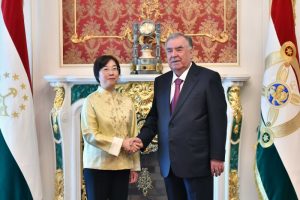 President Emomali Rahmon Receives AIIB President Zou Jiayi in Dushanbe
President Emomali Rahmon Receives AIIB President Zou Jiayi in Dushanbe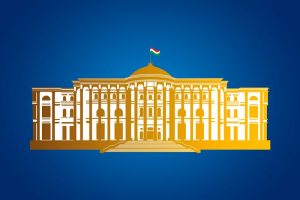 President Emomali Rahmon to Hold Series of Meetings in the Coming Days
President Emomali Rahmon to Hold Series of Meetings in the Coming Days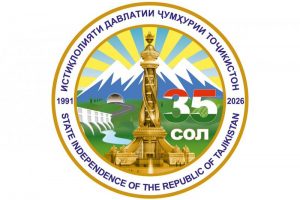 President Emomali Rahmon Approves Emblem for the 35th Anniversary of Tajikistan’s State Independence
President Emomali Rahmon Approves Emblem for the 35th Anniversary of Tajikistan’s State Independence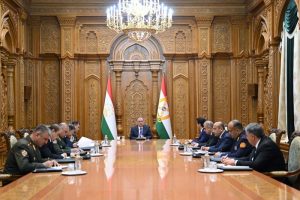 President Emomali Rahmon Holds Working Meeting with Heads of Security and Law Enforcement Agencies
President Emomali Rahmon Holds Working Meeting with Heads of Security and Law Enforcement Agencies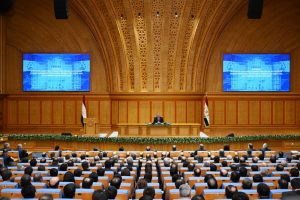 Expanded meeting of the Government of the Republic of Tajikistan
Expanded meeting of the Government of the Republic of Tajikistan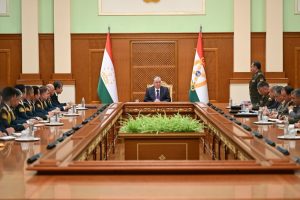 President Emomali Rahmon makes personnel appointments
President Emomali Rahmon makes personnel appointments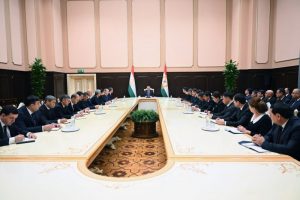 President Emomali Rahmon makes personnel changes in the structures of the Supreme Court, the Higher Economic Court, the Ministry of Foreign Affairs
President Emomali Rahmon makes personnel changes in the structures of the Supreme Court, the Higher Economic Court, the Ministry of Foreign Affairs President Emomali Rahmon makes personnel appointments in the structures of the Ministry of Internal Affairs
President Emomali Rahmon makes personnel appointments in the structures of the Ministry of Internal Affairs














